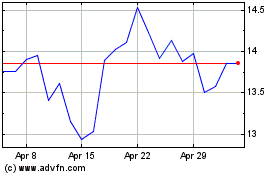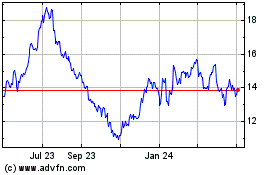CHICAGO—Oscar Munoz, five months after returning from medical
leave to his post as chief executive of United Continental Holdings
Inc., said he now has the management team and board of directors to
regain positive momentum for a carrier still struggling after its
2010 merger.
In an interview, Mr. Munoz, 57 years old, said he was back to
strong health following the heart-transplant operation he needed in
January after a heart attack last fall, just weeks into his new
job.
While his right hand isn't fully functional and he must take
steroids, Mr. Munoz said he was jogging and biking again. The CEO
said he has gone back to shaking hands instead of doing fist bumps
and is flying on commercial airliners instead of taking private
jets, precautions he needed earlier to protect his weakened immune
system.
"I go in for increasingly infrequent checkups," the tanned Mr.
Munoz said in an interview Tuesday. "But I've learned the phrase,
'Just because you can doesn't mean you should.'"
Now, he said, he's eager to make up for lost time. Since
returning to full-time work in March, Mr. Munoz has overseen an
improvement in the carrier's operating performance and forged
better labor relations. Partly under pressure from two hedge funds
that in the spring sought a shake-up in management, Mr. Munoz has
been rebuilding his team and board.
But margins at the nation's third-largest airline by traffic
still lag its biggest competitors, and it needs to regain customers
who defected to rivals over the past few years. United also must
shed its reputation for being a "docile" industry follower and
become more innovative, Mr. Munoz said.
But he is hopeful. "We have a new team, new processes, a new
strategy," he said on Tuesday, speaking in his office on the 11th
floor of Chicago's famous Willis Tower skyscraper. "We've got the
resources. There are no more holes in my management lineup."
On Monday, Mr. Munoz plugged the last hole by hiring an industry
heavyweight who was president at larger rival American Airlines
Group Inc. to take on the role of president at United—a job Mr.
Munoz also held. The addition of Scott Kirby, 49 years old, was an
"opportunistic hiring," Mr. Munoz said.
In recent months, Mr. Munoz and the United board discussed
splitting his job into two. Mr. Munoz could focus on strategy and
finances, and he could leave the day-to-day functions of
operations, marketing, sales and revenue management to someone
else.
"Less than a handful of people" have the skills needed to
oversee revenue at such a large airline, Mr. Munoz said.
In theory, that No. 2 executive could one day take over the top
job, though one person familiar with the matter suggested that Mr.
Kirby's role isn't an automatic path to it.
The move was both fast—taking place over a couple of weeks—and
unusual, said a person knowledgeable about the process. United
reached out when word spread that Mr. Kirby, a veteran airline
executive well-known to Wall Street, was soon to be terminated by
American in an unrelated executive succession decision, the person
said.
Mr. Munoz said the vetting was painstaking, "but we did it
quickly." Likening Mr. Kirby to a National Basketball Association
star, he said: "When LeBron James, shows up at your doorstep,
you're going to let him practice with your team, if not join the
team."
United declined to make Mr. Kirby available for this story.
Mr. Kirby, who was let go by American on Monday, also walked
away with more than $13 million in cash and stock in a voluntary
severance, a payout based on his 21 years of service including
orchestrating two mergers, American said.
The same day, Mr. Kirby started his new role as president at
United, where he received a signing bonus of $5 million in stock
options. He will be paid an annual base salary of $875,000, along
with other incentive-based compensation, according to a regulatory
filing.
The hiring of Mr. Kirby is "an overwhelming positive" for
United, according to Credit Suisse. United shares rose 9% Tuesday
on the news and had slipped 2.6% to $49.66 in midday trading
Wednesday.
Mr. Munoz said he was shocked when he took over a year ago.
The business side had been distracted by the merger and the
investigation into possible corruption involving the airline and
the Port Authority of New York and New Jersey, which ultimately led
to the ouster of then-chairman and CEO Jeff Smisek.
"We weren't unified in what direction we needed to go," he
said.
Morale among the 85,000 employees was terrible, which was "the
soul-destroying part," Mr. Munoz said. The executive said United
should no longer be regarded as "an insolvable puzzle" and must get
on with its turnaround.
Write to Susan Carey at susan.carey@wsj.com
(END) Dow Jones Newswires
August 31, 2016 12:55 ET (16:55 GMT)
Copyright (c) 2016 Dow Jones & Company, Inc.
American Airlines (NASDAQ:AAL)
Historical Stock Chart
From Mar 2024 to Apr 2024

American Airlines (NASDAQ:AAL)
Historical Stock Chart
From Apr 2023 to Apr 2024
